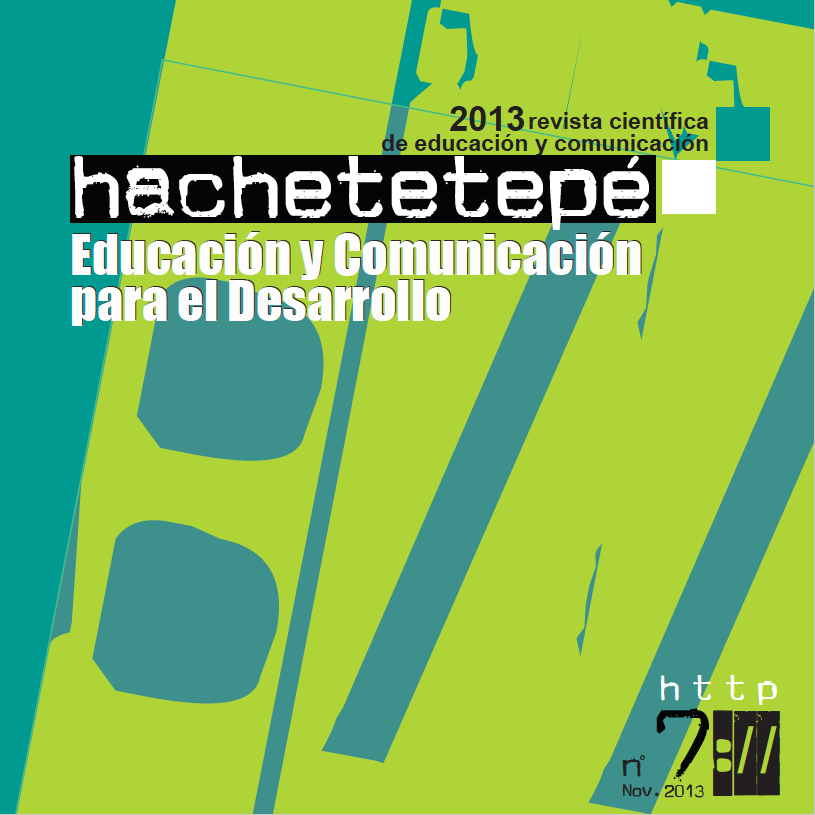Social media and networking in development education.

Info
Abstract
This article presents a reflection on the contributions of the Information Technology and Communication (ICT) and Social Networking to Development Education (DE). It analyzes the evolution of the concept of Development Education. It also describes the main features of Web 2.0 and social networks. It makes recommendations on the use of social networks. Finally we discuss some social networks with interest for Development Education.
Keywords
Downloads
How to Cite
License

This work is licensed under a Creative Commons Attribution-NonCommercial-NoDerivatives 4.0 International License.
Those authors who have published with this journal, accept the following terms:
- They will retain their copyright and guarantee the journal the right to first publication of their work, which will simultaneously be subject to the Creative Commons Attribution License . They may be copied, used, disseminated, transmitted and publicly displayed, provided that the authorship, url, and magazine are cited, and are not used for commercial purposes. No derivative works are allowed.
- They may adopt other non-exclusive license agreements for the distribution of the published version of the work (e.g., deposit it in an institutional telematic archive or publish it in a monographic volume) provided that the initial publication in this journal is indicated.
- Disseminate your work through the Internet (e.g., in institutional telematic archives or on your website) once the manuscript is accepted, which may lead to interesting exchanges and increased citations of the published work. (See The effect of open access).
Hachetetepé. Scientific journal of education and communication does not charge a fee for the submission of manuscripts or for the publication of its articles.
References
Cobo, C. y Pardo, H. (2007). Planeta Web 2.0. Inteligencia colectiva o medios fast food. Grup de Recerca d'Interaccions Digitals, Universitat de Vic: Flacso México. Barcelona / México DF.
Cobo Romaní (2007). Aprendizaje colaborativo. Nuevos modelos para usos educativos. En Cobo, C. y Pardo, H. (2007). Planeta Web 2.0. Inteligencia colectiva o medios fast food. Grup de Recerca d'Interaccions Digitals, Universitat de Vic: Flacso México. Barcelona / México DF. 101-116.
De Haro, J. J. (2010). Red Social Grouply para educación. Blog: Educativa. Disponible en: http://jjdeharo.blogspot.com/ (Consultada el 10 de junio de 2012).
Fundación Orange. Mapa visual de la Web 2.0. Disponible en: http://internality.com/web20/. (Consultada el 10 de febrero de 2013).
HLGE (High Level Group of Experts) (1996). Building the European Information Society for Us All. First
Reflections of the High Level Group of Experts. Interim Report, January, 1996.
O’Reilly, T. (2004). The Architecture of Participation. Documento electrónico disponible en: http://www.oreillynet.com/pub/a/oreilly/tim/articles/architecture_of_participation.html. (Consultada el 15 de junio de 2013).
Macarro, R. y Burgos, M. (2011). Estudio sobre la ED en Andalucía. Fase II: las ONGD. Sevilla: Coordinadora Andaluza de ONGD.
Marquès Graells, P. (2008). Las TIC y sus aportaciones a la sociedad. Documento electrónico disponible en: http://peremarques.pangea.org/tic.htm. (Consultada el 15 de junio de 2013).
Mesa, M. (1994). Educación para el Desarrollo y la Paz. Madrid: Popular.
Milena Moreno, A. (2012). Ventajas de las Redes Sociales en la Educación. Disponible en http://eduredes.ning.com/forum/topics/ventajas-de-las-redes-sociales-en-la-educaci-n?xg_source=activity (Consultada el 10 de febrero de 2012).
Nafría, I. (2007). Web 2.0. El usuario es el rey. Ediciones Gestión 2000. Barcelona: Planeta de Agostini.
S21SEC (2010). Consejos para proteger tu intimidad en redes sociales. Documento electrónico disponible en: http://blog.s21sec.com/2009/03/consejos-para-proteger-tu-intimidad-en.html (Consultada el 19 de octubre de 2012).
Socorro, F. (2004). Redes sociales: una aproximación al concepto. Disponible en: http://www.gestiopolis.com/canales3/ger/redsocial.htm (Consultada el 10 de junio de 2012).
Torres, L.; Ojeda, J.; Monguet, J. y González, H. (2011). PLEs desde la etnografía virtual de la web social. En: Digital Education Review, 20, 14-13. Documento electrónico disponible en: http://greav.ub.edu/der. (Consultada el 10 de mayo de 2013).
UNESCO (2008). Estándares de competencias en TIC para docentes. Londres. Documento electrónico disponible en: http://www.eduteka.org/pdfdir/UNESCOEstandaresDocentes.php (Consultada el 20 de junio de 2013).
Varela, J. (2011). Educación 2.0, no sólo ordenadores. Documento electrónico disponible en: http://www.educacionenvalores.org/spip.php?article2457 (Consultada el 10 de mayo de 2013).
WIKILIBROS (2009). Análisis de redes sociales. Documento electrónico disponible en: http://es.wikibooks.org/wiki/An%C3%A1lisis_de_Redes_Sociales/Conceptos_Fundamentales#Representaci.C3.B3n_gr.C3.A1fica_de_redes_sociales (Consultada el 11 de febrero de 2013).
Zamora, M. (2006). Redes sociales en Internet. Documento electrónico disponible en: http://www.maestrosdelweb.com/editorial/redessociales/. (Consultada el 10 de junio de 2012).

